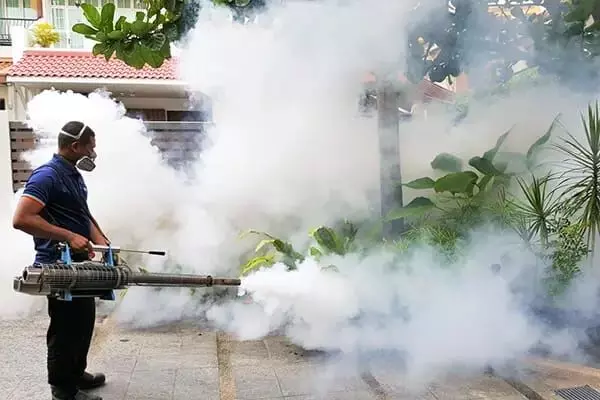70% of households report no fogging for mosquitoes: LocalCircles survey
In 2024, many cases of dengue and chikangunya are being reported even as municipal bodies in Hyderabad
By Sri Lakshmi Muttevi
Hyderabad: There is hardly any big or small city or town in India that does not face mosquito menace during monsoon. When the rains come, every stagnant puddle becomes a breeding ground for all kinds of mosquitoes.
In 2024 too, many cases of dengue and chikangunya are being reported even as municipal bodies in Hyderabad, Pune, Delhi, Mumbai, Bengaluru, Chennai and Kochi have issued warnings and notices to thousands of residents for allowing mosquitoes to breed in open containers and stagnant water in their homes.
Did you know that 49 per cent of households spend over Rs 2,400 per year on mosquito control?
While repellent sprays, creams and machines are the most widely used by households to stay safe from mosquitoes, a survey by LocalCircles in 2024 showed that 7 in 10 households stated that their municipality or panchayat had not done any fogging during the monsoon season.
Data on dengue cases
Vector-borne diseases are quite common during the peak of the summer monsoon, which lasts from June to September and the winter monsoon from October.
In August 2024, minister of State for Health and Family Welfare Prataprao Jadhav informed the Lok Sabha that over 32,000 dengue cases had been reported across the country this year till August 2, as against 18,391 dengue cases during the corresponding period of 2023.
In a written answer, Jadhav said the government and concerned agencies are regularly reviewing and monitoring the situation of dengue outbreaks in the country.
Questioning the competency of the civic bodies, a Hyderabad resident has posted on X, “Why does the city suffer due to dengue, chikungunya and other vector-borne diseases? Mosquitoes literally declared war on the city…. Despite complaints no efforts to stop mosquito breeding in the lakes.”
New symptoms
This alarming variant is presenting new symptoms including blackened noses and paralysis and mimicking dengue with fluid accumulation and low platelet counts.
In Mumbai, BMC executive health officers reported that ‘compared to August 2023, number of cases of malaria, dengue, chikungunya and H1N1 diseases in Mumbai have shown a slight rise in August.’ While 1,013 cases of dengue were recorded in August, the corresponding number for August 2023 was 999.
BMC registered 164 chikungunya cases in August this year as against 35 in August 2023. Recent reports from Bengaluru point to a surge in dengue cases this year. According to the Karnataka State Health Department, dengue cases have breached the 10,000 mark so far this year. Dengue cases can turn fatal at times depending on the severity of the disease and the health of the patient.
Earlier this month on September 3, a 14-year-old student of a Gurugram school lost his life due to severe dengue.
Survey by LocalCircles
In October 2023, 1 in 4 households via LocalCircles had indicated that someone in their family fell ill due to mosquito borne illness in the last three years.
Also, 7 in 10 Indian households surveyed by LocalCircles had indicated that their municipal corporation or panchayat had not done fogging in their area during the monsoon season.
LocalCircles through a national survey has sought to find out what is the peak season for mosquitoes in their area/city/district, how households are tacking the mosquito menace and how much it costs them on a monthly basis to stay safe. The survey received over 54,000 responses from household consumers located in 322 districts of India.
1. 62% of respondents were men while 38% of respondents were women.
2. 45% respondents were from tier 1, 26% from tier 2 and 29% respondents were from tier 3 and 4 districts.
What did the survey show?
1. 49% Indian households spend Rs 200 or more each month on mosquito control; 37% of them spend up to Rs 200.
2. Anti-mosquito repellent sprays, machines, rackets and creams are top items Indian households use to protect themselves from mosquitoes; Only 21% avail any kind of fogging services.
3. Considering that people use several kinds of products to protect themselves against mosquito bites, the survey found that 18,303 who responded to the question indicated more than one option. The largest group of 55% stated that they use ‘repellent liquids, sprays and creams’; 43% stated that they use ‘repellent machines’; 32% stated that they use ‘rackets’ which pass current and kill the mosquitoes and 32% stated that they use ‘mosquito net’.
4. Only 21% avail of any kind of fogging services. Fogging services are generally more expensive and undertaken by apartment societies, AOAs or RWAs.
According to LocalCircles, many respondents selected more than one category of products that they use. On an aggregate basis, anti-mosquito repellent sprays, machines, rackets, creams and mosquito nets are the top items Indian households use to protect themselves from mosquitoes.
As many as 44 per cent Indian households stated that August-October is when their area/district/city has the highest mosquito prevalence. Mosquitoes are believed to be found in abundance during the monsoon season when water collects puddles and unused or open containers in homes and outside or when there is too much humidity.
How many responses?
The survey received over 54,000 responses from household consumers located in 322 districts of India. As many as 62 per cent respondents were men while 38 per cent respondents were women. 45 per cent respondents were from tier 1, 26 per cent from tier 2 and 29 per cent respondents were from tier 3 and 4 districts.